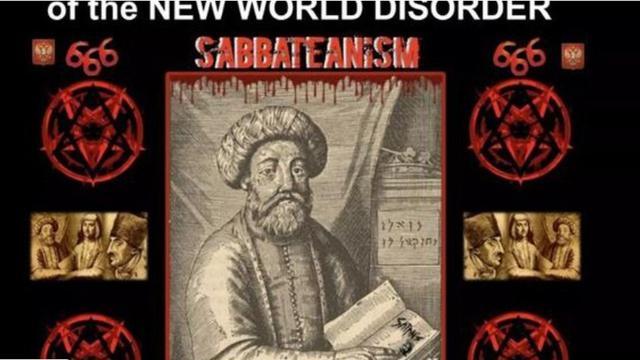A #Satanic #heresy called #Zionism: #Kabbalah #Freemasonry #Babylon #Doomsday #OrdoAbChao #DavidLivingstone
https://www.bitchute.com/video/zyYgiGxKQHYN/
#history
David #Livingstone #Origins of the Satanic Heresy called Zionism - #Gaza Kabbalah Freemasonry Babylon & Doomsday, Order From Chaos The #Great #Plan of #Secret #Societies
https://politicsthisweek.wordpress.com/2023/11/16/not-the-bcfm-politics-show-presented-by-tony-gosling-166/
- Zionism Star of David
https://ordoabchao.ca/volume-three/zionism
The main accomplishment of World War I was to free the land of Palestine from Ottoman control, contributing towards the establishment of the State of Israel, a long-standing objective of the Zionists. World War I was precipitated when the Austro-Hungarian heir Archduke Franz Ferdinand was assassinated in Sarajevo on June 28, 1914. The three chief assassins were Gavrilo Princip and two of his friends, who were all members of a nationalist group called the Order of the Black Hand, a secret society that had been founded in 1911 as the Union of Death to fight for Serbian liberation. The seal of the order was a clenched fist holding a skull and crossbones beside a knife, a bomb and a poison bottle.[1] The involvement of the Russians was purportedly exposed when it was discovered that a secret payment of eight thousand rubles had been given to the Black Hand leader by the Russian military attaché in Belgrade. The order had apparently been accompanied by a promise from Tsar Nicholas II, knight of the Order of the Golden Fleece, that he would support Serbia in the event of war breaking out between Russian and the Austro-Hungarian empire. It was also rumored that representatives of the Black Hand had met with several members of the French Grand Orient at the Hotel St. Jerome in Toulouse in January of that year. One of the topics allegedly discussed was the murder of the emperor Franz Joseph and the archduke Ferdinand.
The Zionist movement was founded by Theodor Herzl—a former member of the German nationalist Burschenschaft (fraternity) Albia—who Anti-Zionist rabbis and other Jewish opponents often compared Herzl disparagingly with Shabbetai Zevi, who declared himself the Messiah in 1666. The Sabbatean influences on the Zionist movement are demonstrated by its rejection of Jewish law, while also adhering to the expectations of the Messiah, whose arrival is expected to initiate the return of all Jews dispersed in the Diaspora to the Promised Land. In “Herzl’s Image and the Messianic Idea,” Arthur Kamczycki explained that, “From the very beginning Zionism opposed the conservative rabbinate and the religious Jewry in general.”[4] According to orthodox interpretation, the restoration of Zion by the Messiah could not be brought about through a human whose actions would be subject to God’s will.[5] Additionally, attempts at estimating the time of the Messiah’s arrival were seen as blasphemy. Herzl, who was aware of this discrepancy, stated that “the orthodoxy should understand that there is no contradiction between God’s will and the Zionist attempt of grabbing the destiny with one’s own hands.”
After World War I, the #British #Government would cede the territory of #Palestine to Zionist colonization, as outlined in the Balfour Declaration, written by Lord Balfour (1848 – 1930) with the assistance of Weizmann to Walter #Rothschild, 2nd Baron Rothschild (1868 – 1937), who had inherited the title of baron from his father, Nathan “Natty” Rothschild (1840 – 1915), head of the English branch of the family founded by his father, Nathan Mayer Rothschild. Before placing their hopes in Britain, the German Zionists had first turned to #Germany, hoping their German imperialism would provide a protectorate in Palestine for Jewish settlement. Herzl first attempted to recruit Kaiser Wilhelm II of Germany (1859 – 1941), to influence Abdul Hamid II (1842 – 1918), a fellow knight of the Order of the Golden Fleece, to seriously consider the proposals of the Zionists.
Herzl attempted to meet the Ottoman Sultan Abdul Hamid II (1842 – 1918), a knight of the Order of the Golden Fleece, in order to present his proposition of a Jewish State to him directly. He failed to obtain an audience but did succeed in visiting a number of highly placed individuals, including the Grand Vizier.
Having failed to gain the support of either the Kaiser or the Sultan, Herzl turned to Great Britain in 1900, joining the pro-British Zionist faction that was soon to be led by Chaim Weizmann (1874 – 1952), President of the World Zionist Organization (WZO), who helped draft the Balfour Declaration, and later first President of Israel. Weizmann was a great admirer of Nietzsche, and sent Nietzsche’s books to his wife, adding in a letter that “This was the best and finest thing I can send to you.”[8] At the time, World War I was referred to as “Nietzsche in Action,”













